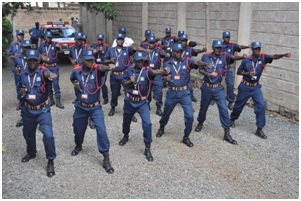Kenya’s Interior Cabinet Secretary Fred Matiang’i in a gazette notice dated September 6, 2019, gave an ultimatum to security firms to comply with new licencing requirements.
The CS revealed that the firms that would not have complied with the new regulations by January 5, 2020, will have to be shut down.
According to a report by The Standard, these firms employ over 500,000 Kenyans and this order leaves their jobs hanging in the balance. The Private Security (General) Regulations 2019, demand that all the 2,500 private security firms in the country register with the Private Security Regulatory Authority (PSRA) led by Fazul Mohamed.
The regulations also state that any individual or firm that needs security services have to engage with firms that have complied. This means that homes, schools, hospitals and other institutions that hire guards from companies that are not registered with the regulator will be committing an offence. The publication further stated that Protective Security Industry Association (PSIA) chairperson, Cosman Mutava, claimed the deadline was unattainable as they require a minimum of three years to comply.
From now on, if firms are to be licensed, they will be required to pay guards on their payroll at least the minimum wage. In the cities of Nairobi, Mombasa and Kisumu, this amounts to Ksh 27,993 for a night guard and Ksh 25,641 for a day guard. In municipalities like Nakuru, Nyeri and Kakamega, this comes to Ksh 25,905 and Ksh 23,208, respectively, and Ksh 16,119 and Ksh 13,575 in all other areas, mostly small urban and rural areas.
These new laws that have raised controversy in some quarters have allowed private guards to bear firearms and also arrest individuals on behalf of the police. They will also be allowed to blare sirens and flash warning lights on highways, a hitherto preserve of police and emergency service providers.
The guards will enjoy these privileges under the guidance of the Inspector General of Police, Hillary Mutyambai. After the firms are registered, PSRA will ensure that the guards undergo fresh training and wear uniforms that do not in any way resemble state security personnel.
The move to allow the guards to operate rapid response vehicles specifically is in line with the government’s intention to remove police officers in Cash In Transit (CIT) work








